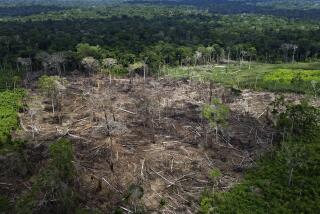Researchers Link Chimp Wars, Logging in West Africa
- Share via
NEW YORK — Logging in the tropical forests of West Africa may be causing devastating wars among the chimpanzees there, concludes a scientist who has studied the animals for eight years.
When Lee White began studying the large mammals of Gabon’s Lope Wildlife Reserve in 1989, he was relieved to see that logging wasn’t a major problem. On average, timber harvesting had removed only about 8% of the tree canopy--not enough to disturb the gorillas, elephants, mandrills and monkeys that inhabit the country’s tropical forest.
But chimps were another story. In his ongoing study, White has found that chimpanzee populations drop by up to 80% as soon as an area is logged, and they don’t recover for 15 to 20 years.
“We were losing eight out of 10 chimps after logging,” said White, a conservation ecologist with the Wildlife Conservation Society. He reported the progress of his research recently at the society’s offices in New York’s Central Park.
Nobody knows for certain why timber harvesting has such a profound effect, not just on the chimpanzees of Gabon, but on those in Cameroon, Ivory Coast, Congo and other African countries. Some of those areas have been heavily logged, but in the Lope Reserve and many other places, the tropical forest is mostly intact.
That has led White and his colleagues to conclude that the logging is causing warfare among the chimpanzees, who are notoriously territorial and are quick to fight when their space is violated.
When the loggers go into a forest region, White explained, they advance in a front. That drives the area’s chimpanzees deeper into the forest--right into the homes of their neighbors.
“You’re essentially going to kick start a chimpanzee war,” White said.
In chimpanzee warfare, combatants literally beat one another to death by pounding or stomping. Jane Goodall’s famous studies at Gombe Stream in Tanzania documented shocking brutality among the chimps there, where one group split into two factions, then engaged in a war that lasted years.
“Those events changed forever my view of chimpanzee nature,” Goodall wrote in her 1990 book “Through a Window.”
The war ended only after every member of the smaller group was dead.
“I think it’s a good working hypothesis,” William McGrew, a professor of anthropology and zoology at Miami University in Oxford, Ohio, said of White’s conclusion. “It’s the best that I’ve heard.”
At last count, Gabon’s chimpanzee population was about 60,000. But if logging continues to reduce chimpanzee populations as drastically as it has in the past, White estimates that their numbers will soon drop to 20,000.
“If we’re right, it’s a major threat to wild chimpanzee populations,” White said. “Our problem is that we haven’t actually observed this happening.”
So he and his colleagues are combing the forest around their field station, looking for evidence of chimpanzee warfare. They’re also asking loggers to change the way they harvest timber, cutting the forest in small patches rather than clearing whole swaths at a time. When that strategy was employed in other parts of Africa, it seemed to help, White said.
More to Read
Sign up for Essential California
The most important California stories and recommendations in your inbox every morning.
You may occasionally receive promotional content from the Los Angeles Times.










